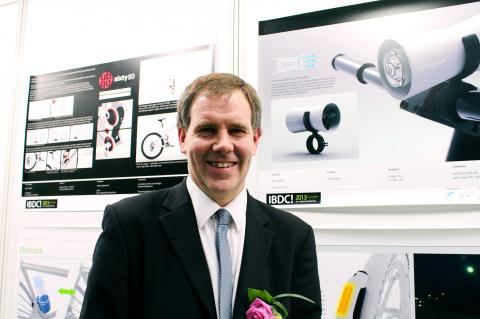Taiwan needs to lower its speed limits and allocate more space for cyclists if it hopes to achieve its aim of becoming a “cycling island,” a visiting expert said.
“The first thing I would tackle is speed,” European Cyclists’ Federation director Kevin Mayne said on Wednesday at the Taipei International Cycle Show.
Mayne, whose federation consists of European national cycling organizations, said speed limits in Taiwan are too high for cars and scooters to coexist with cyclists.

Photo: CNA
Bicycle-friendly cities usually have speed limits of below 30 kilometers per hour, he said, citing German and Dutch cities as examples.
He said lowering speed limits is also a cheap solution to changing Taiwan into a cycling paradise, as nothing needs to be built.
“What you need is political will and enforcement,” he added.
Mayne said cities in Taiwan should allocate more space for cyclists and take bolder steps to improve the environment, citing New York, Paris, London and Vienna as examples of cities that are doing so and upon which Taiwan could model itself.
He said the bike-sharing system in Paris, for example, offered 15,000 bikes when it was first launched, while Taipei’s bike-sharing system, Youbike, currently offers only 1,500.
“Too many cities have started [bicycle schemes] too small,” he said.
Taiwan’s strong bicycle industry could be used to the nation’s advantage in developing it into a cycling paradise, Mayne added.
The Taiwanese people’s underlying interest in cycling — evident in the fact that many people still ride bikes on the roads despite the traffic conditions — is also an advantage, he added.
He said there are economic benefits to turning Taiwan into a “cycling island,” including savings in public health, transportation costs and road repair, lower carbon emissions, better air quality, less traffic congestion and a more vibrant and healthier society.
According to King Liu (劉金標), chairman of Taiwan’s bicycle titan Giant, the government invested NT$3 billion (US$100.85 million) to build 2,088km of bike lanes around the nation from 1999 to 2011.
The government plans to invest a further NT$1.2 billion to build more bike lanes in the next four years, he added.

A preclearance service to facilitate entry for people traveling to select airports in Japan would be available from Thursday next week to Feb. 25 at Taiwan Taoyuan International Airport, Taoyuan International Airport Corp (TIAC) said on Tuesday. The service was first made available to Taiwanese travelers throughout the winter vacation of 2024 and during the Lunar New Year holiday. In addition to flights to the Japanese cities of Hakodate, Asahikawa, Akita, Sendai, Niigata, Okayama, Takamatsu, Kumamoto and Kagoshima, the service would be available to travelers to Kobe and Oita. The service can be accessed by passengers of 15 flight routes operated by

Chinese spouse and influencer Guan Guan’s (關關) residency permit has been revoked for repeatedly posting pro-China videos that threaten national security, the National Immigration Agency confirmed today. Guan Guan has said many controversial statements in her videos posted to Douyin (抖音), including “the red flag will soon be painted all over Taiwan” and “Taiwan is an inseparable part of China,” and expressing hope for expedited reunification. The agency last year received multiple reports alleging that Guan Guan had advocated for armed reunification. After verifying the reports, the agency last month issued a notice requiring her to appear and explain her actions. Guan

GIVE AND TAKE: Blood demand continues to rise each year, while fewer young donors are available due to the nation’s falling birthrate, a doctor said Blood donors can redeem points earned from donations to obtain limited edition Formosan black bear travel mugs, the Kaohsiung Blood Center said yesterday, as it announced a goal of stocking 20,000 units of blood prior to the Lunar New Year. The last month of the lunar year is National Blood Donation Month, when local centers seek to stockpile blood for use during the Lunar New Year holiday. The blood demand in southern Taiwan — including Tainan and Kaohsiung, as well as Chiayi, Pingtung, Penghu and Taitung counties — is about 2,000 units per day, the center said. The donation campaign aims to boost

The Central Weather Administration (CWA) said a magnitude 4.9 earthquake that struck off the coast of eastern Taiwan yesterday was an independent event and part of a stress-adjustment process. The earthquake occurred at 4:47pm, with its epicenter at sea about 45.4km south of Yilan County Hall at a depth of 5.9km, the CWA said. The quake's intensity, which gauges the actual effects of a temblor, was highest in several townships in Yilan and neighboring Hualien County, where it measured 4 on Taiwan's seven-tier intensity scale, the CWA said. Lin Po-yu (林柏佑), a division chief at the CWA's Seismological Center, told a news conference